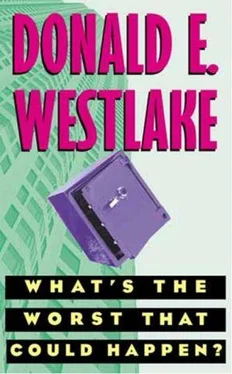The floor plan was mostly little rectangles of numbered rooms, with a central corridor. In the middle of each of the three sides was a cluster of service elements: staircase, elevators, ice machine, and unmarked rooms that would be storage for linens and cleaning supplies. Of course, Max Fairbanks’s apartment didn’t show on this simple floor plan, but Dortmunder already knew it was above the theater and below the hotel and that it faced onto Broadway. So the service cluster on the Broadway side must be the one that contained the special elevator. Dortmunder’s room was around on the south side, so when Andy got here they’d—
The door whacked Dortmunder sharply on the nose. He stepped back, eyes watering, and Andy himself came in, saying, “I hope I’m not early.”
“You’re not early,” Dortmunder said, massaging his nose.
Andy peered at him, concerned. “John? You sound like you got a cold.”
“It’s nothing.”
“Maybe the air-conditioning,” Andy suggested. “You know, these buildings, it’s all recycled air, it could be you—”
“It’s nothing!”
May came out of the bathroom, looking more awake. “Hi, Andy,” she said. “Right on time.”
“Maybe a minute early,” Dortmunder said. His nose was out of joint.
May said, “A minute early is right on time.”
“Thank you, May.”
Dortmunder, seeing no future in remaining irritated, let his nose alone and said, “We got this little floor plan here,” and showed Andy the chart on the door. He explained where they were, and where the service elevator to the apartment should be, and Andy said, “Can it be that easy?”
“Probably not,” Dortmunder said.
“Well, let’s go look at it anyway,” Andy said.
May said, “John, where’s the control?”
“The what?”
“For the TV,” she said. “The remote control. I thought I’d watch television while you’re away, but I can’t find the control.”
“Maybe it’s in the bed,” Dortmunder said.
“Maybe it’s under the bed,” Andy said.
They all looked, and didn’t find it. May said, “This is only one room and it isn’t that large a room and it doesn’t have that many things in it. So we have to be able to find the control.”
Andy said, “Are you sure you ever had a control?”
“ Yes . That’s how I turned it on in the first place. And, John, you were changing channels one time.”
“So it ought to be in the bed,” Dortmunder said.
“Or under the bed,” Andy said.
They all looked again and still didn’t find it, until Andy went into the bathroom and said, “Here it is,” and came out with the control in his hand. “It was next to the sink,” he said.
“I’m not even going to ask,” May said, taking it from him. “Thank you, Andy.”
“Sure.”
Dortmunder, who didn’t believe he was the one who had carried the control into the bathroom in the first place, but who saw no point in starting an argument, said, “Can we go now?”
“Sure,” Andy said, and they left.
The corridor was long, not too brightly lit, and empty. Here and there, room service trays with meal remnants waited on the floor. Dortmunder and Andy went down to the end of the corridor, turned right, and here was another identical corridor, with identical carpeting and lighting and room service trays. Midway along, an illuminated green sign on the right, up near the ceiling, said EXIT . “Down there,” Dortmunder said.
Halfway along the corridor, under the green exit sign, were the elevators, on the right, the inner side of the building, away from the street. Next to the elevators on their left was the staircase, and next to them on their right was the room containing the ice machine. Opposite the elevators was a blank wall decorated with a mirror and a small table and a chair with wooden arms. Opposite the staircase was an unmarked door.
Unmarked and locked. Andy spoke to it, gently, and soon it opened, and they stepped through into a square room filled with rough wooden shelves on which were piled stacks of linen, of toilet paper, of tissue boxes and boxes containing soap and shampoo and body lotion. To their left was an open space in front of two sets of elevator doors.
“One of these,” Dortmunder said, nodding at the elevator doors. “Ought to be, anyway.”
“Maybe the one that’s coming,” Andy said.
Dortmunder listened, and could hear the faint buzzing whirr of an elevator moving upward through its shaft. “Not to this floor, though,” he said.
“Well, maybe,” Andy said. “Let’s wait back here.”
Dortmunder followed him, and they faded back into the rows of supplies, just as the whirring stopped and they heard the elevator doors open. Andy lifted an eyebrow at Dortmunder— see? —and Dortmunder lowered an eyebrow at Andy: yeah, I see.
Looking through mountains of clean towels, they watched a guy in a black-and-white waiter outfit push an empty two-tiered gray metal cart out of the elevator. Its doors closed behind him as he opened the door to the main corridor, pushed the cart through, and disappeared.
Speaking softly, Andy said, “Gone to pick up those trays.”
“So we’ve got a few minutes.”
They left the supplies, went over to the elevators, and Andy pushed the up button. The elevator that had brought the waiter was still there, so its doors immediately opened. Andy held them open while he and Dortmunder studied the simple control panel inside. It was just black buttons with numbers on them, 31 the highest number (they were at the moment on 26) and 17 the lowest number, with two more buttons below 17, marked KITCHEN and LAUNDRY .
“So it must be the other one,” Andy said.
“Or,” Dortmunder said, contemplating the control panel, and thinking about how his luck tended to run, “we didn’t figure it right.”
“What else could it be? So we’ll hang around here till the waiter comes back through, and then we’ll bring up the other one.”
“We’ll see what happens,” Dortmunder agreed.
They released the elevator door and went back to the stacks of towels. “It probably won’t be just a button,” Dortmunder said. “I mean, if we’re right about it. It’ll probably be a key, for the security.”
“Sure. You can go to any other floor in that elevator, but you can’t go to that floor unless you’ve got the key.”
The waiter opened the door from the hall and pushed in the cart, now piled high with trays and dishes and utensils. He maneuvered the cart, which was apparently unwieldy when full, around to the elevator, thumbed open the doors, pushed the cart aboard, pushed a button inside, and disappeared.
Immediately, Andy went out and pushed the up button. There were no lights or indicators to say whether or not the other car was coming; they could only wait and see.
“Of course,” Dortmunder said, following, “they might have the other one shut off at night.”
“Why? They got a lot of stuff to do all night long. And you know? Come to think of it, maybe we should duck back in there again.”
“What for?”
“Well, just in case,” Andy said, “when the elevator gets here, and the door opens, there’s somebody aboard.”
“Right,” Dortmunder said.
So they went back to the towels and waited, and soon the other elevator did arrive, and when its doors opened, it was empty. Andy hurried to it before the doors could shut again, and he and Dortmunder studied the control panel, which was identical to the first one. “Naturally,” Dortmunder said.
“They’ve gotta clean,” Andy insisted. “Somehow, they’ve gotta clean. Rich people clean a lot, they hire whole companies to clean.”
“Let’s take a look on seventeen,” Dortmunder said.
Читать дальше












